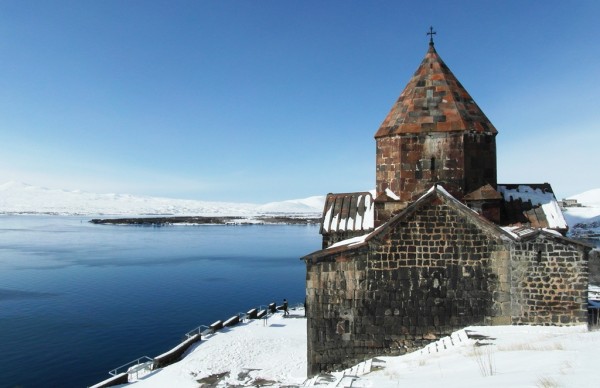
“The movement, migration or scattering of a people away from an established or ancestral homeland; people settled far from their ancestral homelands.”
This is one of the definitions of the word “diaspora” – a word which I was not very familiar before arriving in Armenia in early March to volunteer with the Armenian Volunteer Corps (AVC). It soon became part of my everyday vocabulary as I met my fellow volunteers, all of whom were volunteering as part of through AVC’s sister organization, Birthright Armenia.
Birthright Armenia facilitates volunteer opportunities in Armenia for members of the Armenian diaspora between the ages of 20 and 32. However, their overall mission runs deeper, aiming “to strengthen ties between the homeland and Diasporan youth by affording them an opportunity to be a part of Armenia’s daily life and to contribute to Armenia’s development through work, study and volunteer experiences, while developing life-long personal ties and a renewed sense of Armenian identity.”
Like many recent graduates or career breakers who choose to volunteer, I went to Armenia simply hoping to learn more about the country and contribute to the community through volunteering while also gaining some professional experience for my resume. It didn’t take me long to realize that whatever I learned through my experience in Armenia (which was a lot), it would likely pale in comparison to the journey of self-discovery that the Birthright volunteers were pursuing.

See, I am basically a mutt of mixed ancestry (Norwegian, German, English and Swedish). My ancestors came to the United States in the mid-1800s, seeking a better life but in no way fleeing from war or escaping a genocide. While I have vague recollections of German Christmas carols and Norwegian lefse as a young child, I didn’t grow up with a strong sense of the culture or traditions of my “homelands.” I visited Norway in 2006, tracing my family roots and visiting the small town and farms from which my ancestors hailed. It was a meaningful and moving experience for both me and my family (especially my grandfather), but I wouldn’t call it powerful or life-changing. Likewise, I have visited Germany on five different occasions, feeling very little emotional attachment to the country at all.
While it was hard for me to fully understand how it felt for Birthright volunteers to come to Armenia, I wanted to at least try.
A large number of those who make up today’s Armenian diaspora communities descend from survivors of the Armenian Genocide during World War I. An estimated half a million Armenians fled their native land to escape the Genocide and established communities all over the world. Other diasporan Armenians left much more recently – during the war with Azerbaijan over Nagorno-Karabakh between 1988 and 1994. Today, an estimated 7 million ethnic Armenians live outside of Armenia, with only around 3 million living inside the small country.
To my surprise, large Armenian communities exist throughout the United States, particularly in and around Los Angeles, Boston and Philadelphia, cities from which many of my fellow volunteers hailed. Several grew up speaking Armenian at home and some even attended Armenian school. From the moment I arrived, I was in awe of how strongly Armenian so many of my fellow volunteers felt – even those whose parents weren’t born in the country.
For example, like many volunteers, Anita Postaljian’s parents don’t even hail directly from Armenia – her dad came from Aleppo, Syria and her mom from Lebanon. Despite that, her first language growing up near Boston was Armenian and she attended a private Armenian school until she was 10 years old.
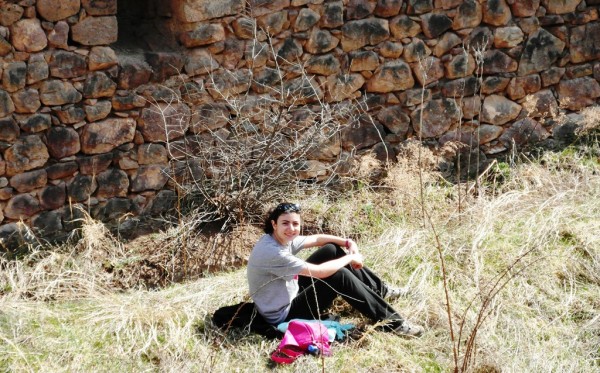
Similarly, Sylvia Ohanyan, 23, grew up in Philadelphia and attended an Armenian grade school until 8th grade. With over 25,000 Armenians in the Philly area, most of her friends growing up were Armenian and her parents spoke Armenian to her at home. She has only distant relatives in Armenia.
Anahid, also 23, was born in Bulgaria before coming to the United States with her parents and growing up in the heavily Armenian community in Glendale near Los Angeles. Other volunteers were born and raised in Germany, Belgium, Russia, Lebanon, and even Argentina.
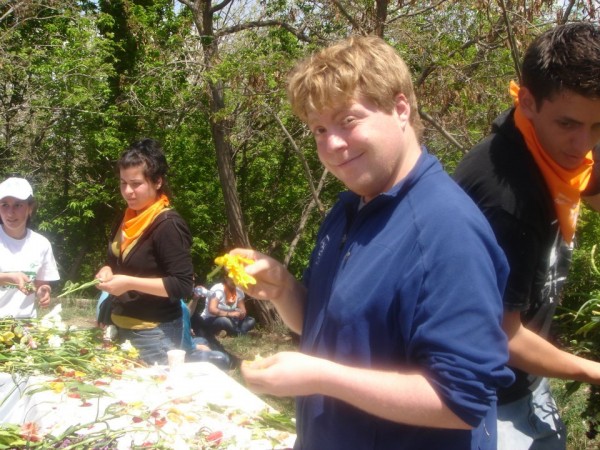
On the other hand, some volunteers like Jordan Takvorian, 26, arrived in Yerevan with very little knowledge of Armenia or its culture. As he told me,
“[M]y whole life I was told that I’m Armenian and that I’m a diasporan but I really had no idea what any of that meant. I wasn’t raised with Armenian customs, holidays, or the language, however often I would drive with my father to the Armenian community in Watertown to get Armenian food. He also always sent out our family Christmas cards for January 6th rather than December 25th. There’s a myriad of little differences that despite not being truly raised Armenian I was always raised to think I was a little different. So I wanted to learn more about that. I came here expecting to feel like an oddball…the diasporan who wasn’t brought up to be a diasporan. I didn’t come here to repatriate or marry or any of that. I just wanted to find a reason why my whole life if I meet someone with an Armenian last name we always feel compelled to talk about being Armenian.”
Jordan further explained that he has come away with a perspective on Armenia that he didn’t previously have, as well as a better understanding of both his family and the country. “It’s an actual place. Not just that random land where some distant relative came from,” he explained. “There are things I love about Armenia and the culture and plenty of things I hate.”
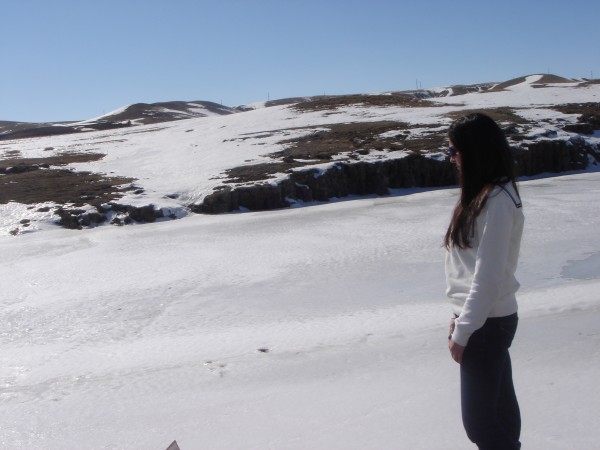
For Anita, 28, it has been a spiritual, emotional, physical and mental journey – so much so that she decided to extend a two month volunteer stint by four more months. Anita says that she feels comfortable and at home in Armenia:
“It’s a developing country that needs a lot of help, yes, but it’s so exciting to be here while all this change is happening. Diasporan Armenians forget how young this country is and the struggles they went through when the Soviet Union collapsed. I have a better appreciation for my culture, my people, myself. I have learned to appreciate the smaller things in life and be grateful for the things I have access to in the States.”
Like Anita, Sylvia arrived with no expectations because she didn’t know what to expect. After two months in Yerevan, she says she has become more open to her Armenian identity since all of her close friends back home are American. Although she found it hard to relate to Armenians in Philadelphia before coming to Yerevan, she now says “it’s cool to come together with diasporans from all around the world and relate because we’re all going through the same experience.”
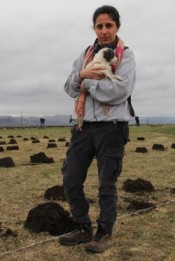
For Anahid, who is in Armenia for the third time, volunteering with Birthright isn’t just about an experience, it is about setting up a new base:
“My time in Armenia is an ongoing permanent aspect of my life–forever, whether I’ll have Armenia as my ‘home base’ or not…few things interest me more than its language, culture, history and what’s happening day in and day out in the present. Each day I feel affirmed in my decision to stay here, and I know that when I am away from here (as I was for most of my life), I’ll hear of what’s happening here and kick myself for staying away.”
Anahid was not the only volunteer I met who was planning to stay – several others had already decided to truly call Armenia home, even applying for Armenian citizenship. And others, like Anita, are leaving that door open:
“I never want to lose touch with Armenia, whether it’s through work or the people I have met. I will come back as often as I can. And who knows, maybe one day I will have a home base here.”
You can read more from volunteers like Anita, Sylvia, Jordan and Anahid on the Birthright Armenia blog and the Armenian Volunteer Corps blog.
Have you ever returned to the place of your roots to volunteer? What was your experience like?
